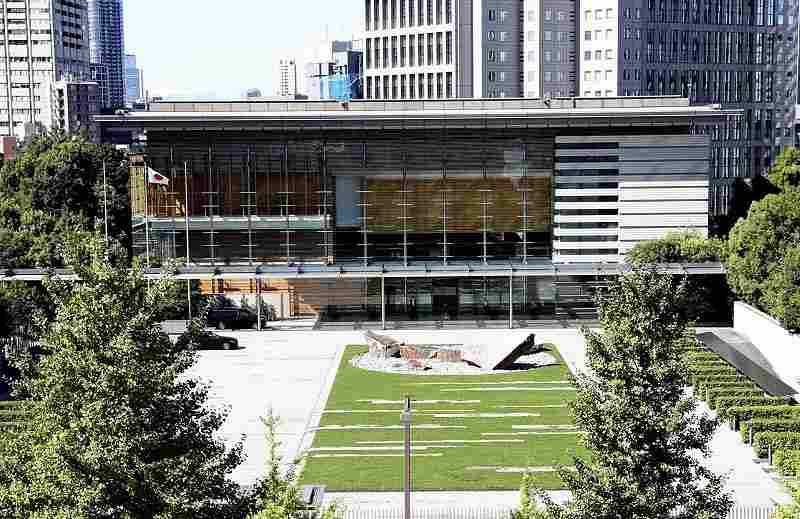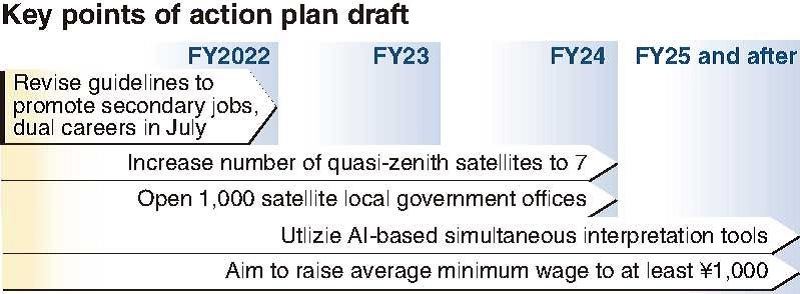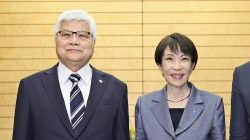Goal to raise minimum wage to ¥1,000 by fiscal 2025 to be included in Kishida’s ‘new capitalism’ action plan

The Prime Minister’s Office in Tokyo
20:00 JST, June 2, 2022
The government aims to raise the national average of minimum hourly wage to at least ¥1,000 by fiscal 2025, as part of efforts to increase incomes, which the administration of Prime Minister Fumio Kishida has positioned as a key measure to boost consumption and support economic recovery from the coronavirus pandemic.
The government is expected to include the goal in an action plan on Kishida’s signature “new capitalism” policy that is set to be approved by the Cabinet next Tuesday, The Yomiuri Shimbun has learned.
The national average minimum wage is currently ¥930. The minimum wage in Tokyo is ¥1,041 and in Kanagawa Prefecture it is ¥1,040. The minimum wage is lowest in the prefectures of Kochi and Okinawa, at ¥820.
Many other prefectures have minimum wages in the ¥800 range.
The government wants to eliminate regional disparities and improve the terms of nonregular employees and other workers, aiming to raise the weighted average minimum wage to ¥1,000 or higher by boosting income levels nationwide, according to sources.
A draft of the Basic Policy on Economic and Fiscal Management and Reform, which was released by the government Tuesday, states that the government will work on wage increases with the aim of raising the average minimum wage to ¥1,000 as soon as possible.
Minimum wage increases are determined every year through discussions by the Central Minimum Wages Council, an advisory body to the health, labor and welfare minister comprising labor and management representatives, among others.

The government has stressed the need to ensure the benefits of wage increases are widely felt among employees of small and midsize companies and nonregular workers nationwide to realize a “virtuous cycle of growth and distribution.”
The aim is to stimulate consumer spending, which accounts for more than half of the nation’s gross domestic product.
Some small and midsize companies have been reluctant to raise wages, but the growing labor shortage has increased the need to do so in order to secure human resources.
To develop an environment that will help small and midsize companies raise wages, the government will consider expanding subsidies for companies that increase pay levels, according to the sources.
The government will also revise relevant guidelines this July to accelerate efforts to allow employees to have secondary jobs or dual careers, according to the sources.
In terms of investment in science and technology, the government wants artificial intelligence-based simultaneous interpretation tools to be used widely by 2025.
Top Articles in Business
-

Prudential Life Insurance Plans to Fully Compensate for Damages Caused by Fraudulent Actions Without Waiting for Third-Party Committee Review
-

Narita Airport, Startup in Japan Demonstrate Machine to Compress Clothes for Tourists to Prevent People from Abandoning Suitcases
-

JR Tokai, Shizuoka Pref. Agree on Water Resources for Maglev Train Construction
-

KDDI Opens AI Data Center at Former Sharp Plant in Osaka Prefecture; Facility Will Provide Google’s Gemini AI Model for Domestic Users
-

Toyota Motor Group Firm to Sell Clean Energy Greenhouses for Strawberries
JN ACCESS RANKING
-

Japan Institute to Use Domestic Commercial Optical Lattice Clock to Set Japan Standard Time
-

Israeli Ambassador to Japan Speaks about Japan’s Role in the Reconstruction of Gaza
-

Man Infected with Measles May Have Come in Contact with Many People in Tokyo, Went to Store, Restaurant Around When Symptoms Emerged
-

Prudential Life Insurance Plans to Fully Compensate for Damages Caused by Fraudulent Actions Without Waiting for Third-Party Committee Review
-

Woman with Measles Visited Hospital in Tokyo Multiple Times Before Being Diagnosed with Disease
























